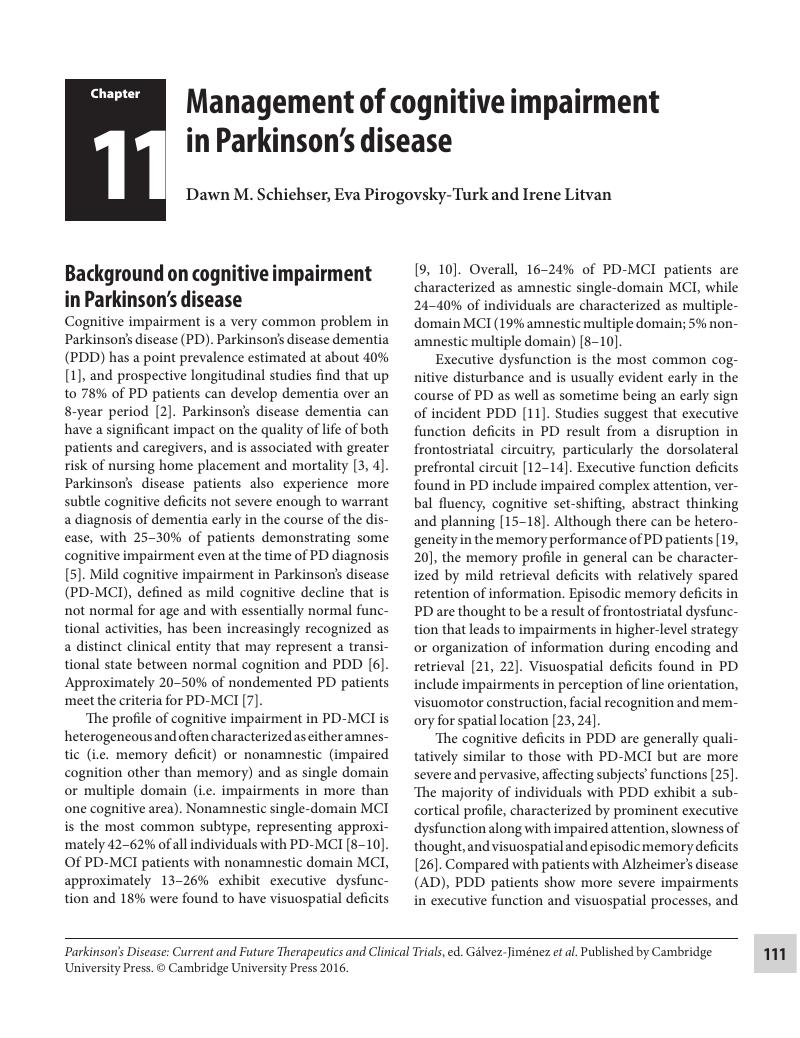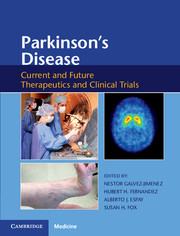Book contents
- Parkinson's DiseaseCurrent and Future Therapeutics and Clinical Trials
- Parkinson's Disease
- Copyright page
- Contents
- Contributors
- Book part
- Section I The Pharmacological Basis for Parkinson's Disease Treatment
- Section II Management of Nonmotor Symptoms of Parkinson's Disease
- Chapter 10 Management of autonomic dysfunction in Parkinson's disease
- Chapter 11 Management of cognitive impairment in Parkinson's disease
- Chapter 12 A neurobehavioralist approach to the management of cognitive impairment in Parkinson's disease
- Chapter 13 Management of disease-related behavioral disturbances in Parkinson's disease
- Chapter 14 Management of treatment-related behavioral disturbances in Parkinson's disease
- Chapter 15 Management of sleep disorders in Parkinson's disease
- Chapter 16 Management of pain and neuromuscular complications in Parkinson's disease
- Section III Surgical Management of Parkinson's Disease
- Section IV Clinical Trials in Parkinson's Diease: Lessons, Controversies and Challenges
- Index
- References
Chapter 11 - Management of cognitive impairment in Parkinson's disease
from Section II - Management of Nonmotor Symptoms of Parkinson's Disease
Published online by Cambridge University Press: 05 March 2016
- Parkinson's DiseaseCurrent and Future Therapeutics and Clinical Trials
- Parkinson's Disease
- Copyright page
- Contents
- Contributors
- Book part
- Section I The Pharmacological Basis for Parkinson's Disease Treatment
- Section II Management of Nonmotor Symptoms of Parkinson's Disease
- Chapter 10 Management of autonomic dysfunction in Parkinson's disease
- Chapter 11 Management of cognitive impairment in Parkinson's disease
- Chapter 12 A neurobehavioralist approach to the management of cognitive impairment in Parkinson's disease
- Chapter 13 Management of disease-related behavioral disturbances in Parkinson's disease
- Chapter 14 Management of treatment-related behavioral disturbances in Parkinson's disease
- Chapter 15 Management of sleep disorders in Parkinson's disease
- Chapter 16 Management of pain and neuromuscular complications in Parkinson's disease
- Section III Surgical Management of Parkinson's Disease
- Section IV Clinical Trials in Parkinson's Diease: Lessons, Controversies and Challenges
- Index
- References
Summary

- Type
- Chapter
- Information
- Parkinson's DiseaseCurrent and Future Therapeutics and Clinical Trials, pp. 111 - 121Publisher: Cambridge University PressPrint publication year: 2016

